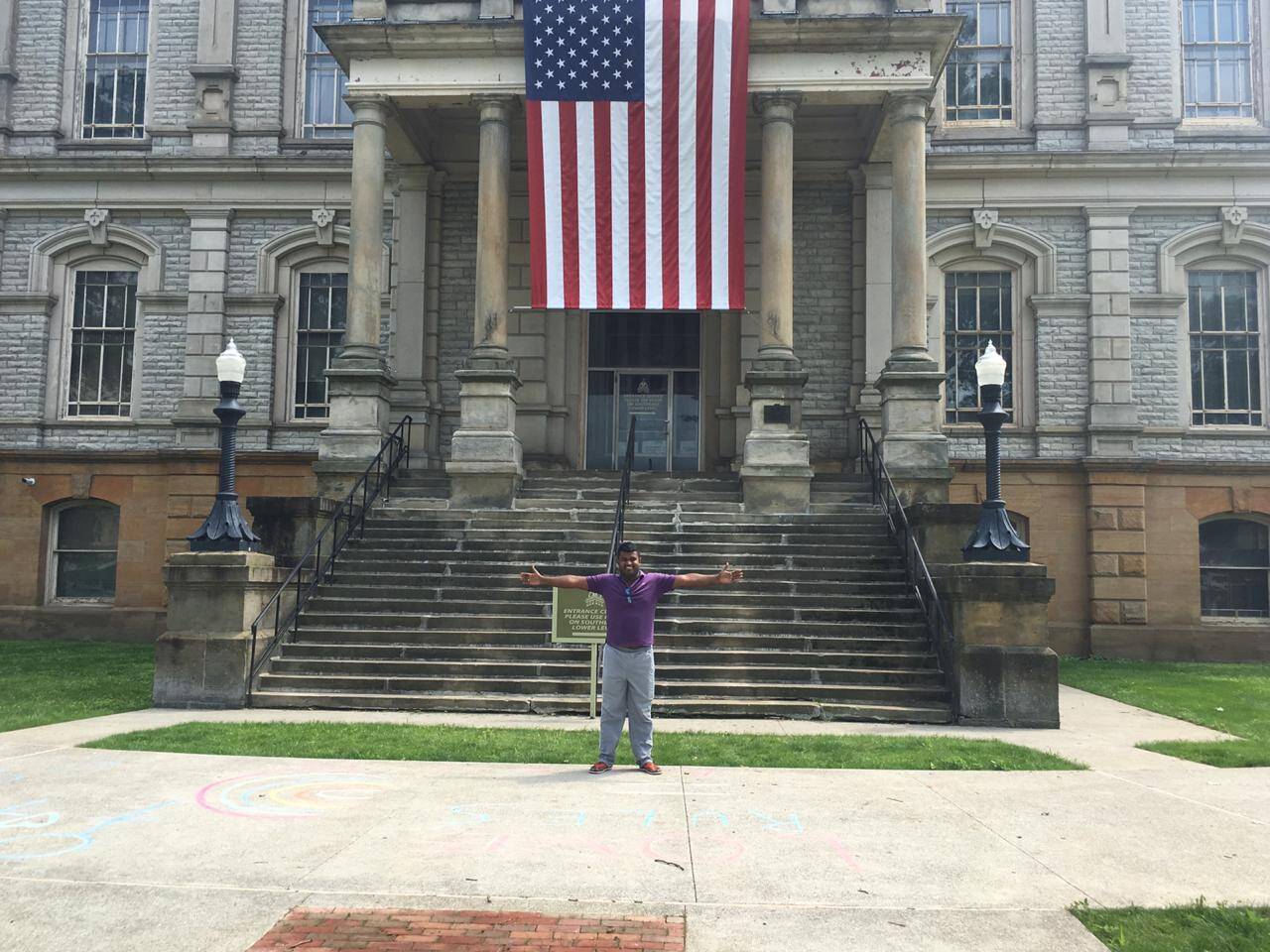
People traveling to the United States for the first time often don’t know what to expect. Can we really blame them? The Unites States has been described as 50 countries masquerading as one. Everyone who visits comes away with a different angle. Even Americans often can’t agree when it comes time to discern fact from fiction. We at Creator Villa thought it would be a good idea to consult our friend and contributor Professor Contreras, who has spent considerable time in the United States. Professor Contreras was featured in another blog post on improving accent quality. He has been teaching English in Colombia for 10 years and is currently on the faculty at La Universidad del Magdalena. The following is an account of a live 2-hour interview on WhatsApp. In it Professor Contreras adds his drop to the bucket of perspectives on life in the United States based on his colorful experiences in Columbus, Ohio and Pensacola, Florida.
Tell the audience a little bit about your background.
I was born and raised in a tiny coastal town in Colombia called Simaña. The population is about 2,000.
When did you first get the desire to visit the US?
Everything started when I was in the seventh grade. English at my school was mandatory. That didn’t mean you learned it, but it meant you had to take classes. My motivation was to be the best in everything. There was a classmate I competed with. I didn’t really care about English, but I wanted to be better than her, so I studied hard. My approach changed in the 10th grade when I met a missionary from Canada. I realized how important English was as a world language. I took up an interest in Canada starting out, not the United States. I also realized that English had this magical effect on people. It was the easiest way to impress others.
Is it uncommon for someone from your hometown to speak English?
Very uncommon. Nobody there speaks English. When I go there today, the people know I am a teacher so they make their best attempt, but they all sound ridiculous. Simaña is a very poor town. Few people from there have access to higher education.
How did your interest evolve from Canada to the US?
In 10th grade, I attended a church camp. A lady at the camp prophesied to me that I would travel to the nations and that I would not need a translator. From that day forward, God began placing a desire in me to learn English. My focus shifted to the US after I learned that many American missionaries came to Colombia in the 1980s. In those days Colombia was going through a hard time. The guerrillas were killing people. Narcos like Pablo Escobar were on the streets. But the missionaries came anyway and many were murdered. When I read their stories, I was inspired to go to the US to repay them for their sacrifices.
American media was another thing. Movies like Home Alone set in beautiful New York City spoke to my imagination. I visualized myself being rich and traveling the globe. But I had a lot of doubters. People said I wouldn’t make it because they knew I didn’t have the money. People from my hometown have this belief that nobody from there will ever be successful. Nobody thought me and my brother could become professionals. We were children of a single mother whose salary was less than the minimum wage. They thought “Who the hell does this guy think he is?” It reminds me of what people said about Jesus in the Gospels, “Can anything good come from Nazareth?” Looking back, the doubt was a good thing because it helped build my self-confidence.
So you used the doubt as motivation?
Yes, I always believed in myself. But people’s tone eventually changed. When they saw my English was getting good and I was picking up the American accent, they started calling me gringo. Others called me Obama. They made this connection between me and the US. And that fueled my imagination even more. I would speak English everywhere. It became a part of who I am. I loved English like a woman. You have to conquer a woman. You have to win her heart. I fell in love with English to the point that I loved it more than my native language. Speaking English made me feel good because it impressed others. And I would visualize myself as an American. I would tell people I am Colombian with an American heart.
All of this happened many years before you had the opportunity to visit the US?
I surrendered this desire to God a long time ago. I said, “If it’s your will, I will go. If it’s not your will, I won’t go.” On election night in 2016, the day Trump got elected, God told me I would go to the US under his administration. And so my desire to travel was renewed. I started asking “What is New York like? What is Orlando like?” And I started to see myself living somewhere in the US. I was practicing visualization at the time without even knowing it.
I know it’s not easy for Colombians to get an American visa. What was the application process like?
That’s right—a lot of people don’t get accepted. And the application is not cheap. So I wanted to make sure I would get the visa before I applied. On November 9th, the day after Trump got elected, I got my passport. And I made a declaration that I would have my visa by the same time next year. The university required all teachers to take an English proficiency test called TOEFL (Test of English as a Foreign Language). After I finished taking the exam, I felt God leading me to move forward with the process. I filled out the form, paid the $160, and scheduled the interview at the embassy. Before the interview, I kept visualizing the words “visa accepted.” I was a little bit nervous, but I was 100% sure I was going to get the visa. When the embassy officer said “your visa has been approved,” I almost cried. I was so happy.
Where in the US did you go?
Columbus, Ohio. I had met an American using a language exchange application called HelloTalk. And we became close friends. We made plans for the summer of 2018 when the weather would be nice. I arrived in the states on June 7 at 1:40 AM.
What was your first thought when you arrived in the US?
I was concerned quiet frankly. My mom came with me to the airport to say goodbye. She cried when I got on the plane. I cried too, I have to say. This was my first time overseas and she was scared of what would happen to her son. But I was concerned for another reason. I had been speaking Spanish with her in the days before my departure. I was afraid my mind wouldn’t be able to make the switch to English. But when we arrived in Miami, there were no problems. I was also scared of customs. I didn’t want them to deport me or keep me from entering. It was after I passed customs that the realization hit me that I was in the United States. I could see planes leaving through the window at the airport. I said, “Finally I am in the place where I want to be!” When my friend picked me up from the airport, it was like a dream. Like a movie in 3D—you know the kind where you feel like you’re in it.
Did you experience culture shock?
No, in the sense that I had read a lot about the US and watched a lot about the US. I knew what to expect. I was amazed because I was living it firsthand, but I was not surprised. The only thing that shocked me is that everybody there plays a sport. And people love going to the gym. Basketball hoops in every driveway, baseball in the backyard. People are really passionate about sports in the US. And that surprised me because you always hear Americans are obese. But in reality many of them have this habit of going to the gym and playing sports.
What are some other things that stood out to you?
The food. I say the food because the American friend I was staying with was of Middle Eastern descent. Middle Eastern people eat a lot, like Colombians, but I think they eat more than we do. And the shakes—my God. I remember the first shake I drank in the US. It was from Smoothie King. When I drank that shake, it was like heaven to me. I couldn’t believe that there was such a delicious thing on planet earth. After I drank that thing, I didn’t want to drink anything else. I was so full I felt like I had eaten a big lunch.
What was your favorite part of being in the US?
Oh, man, a lot of favorite parts. I liked visiting Washington, DC. DC was something God had planned. He wanted me to go to DC to pray in front of Capitol Hill. I never thought DC would be as great as it was, quite frankly. To see how organized the city was, how polite the people were. But I was surprised I didn’t see any dogs on the streets. In Colombia it’s normal for us to see dogs everywhere we go.
I lived in DC for 5 years, and there are plenty of dogs. .
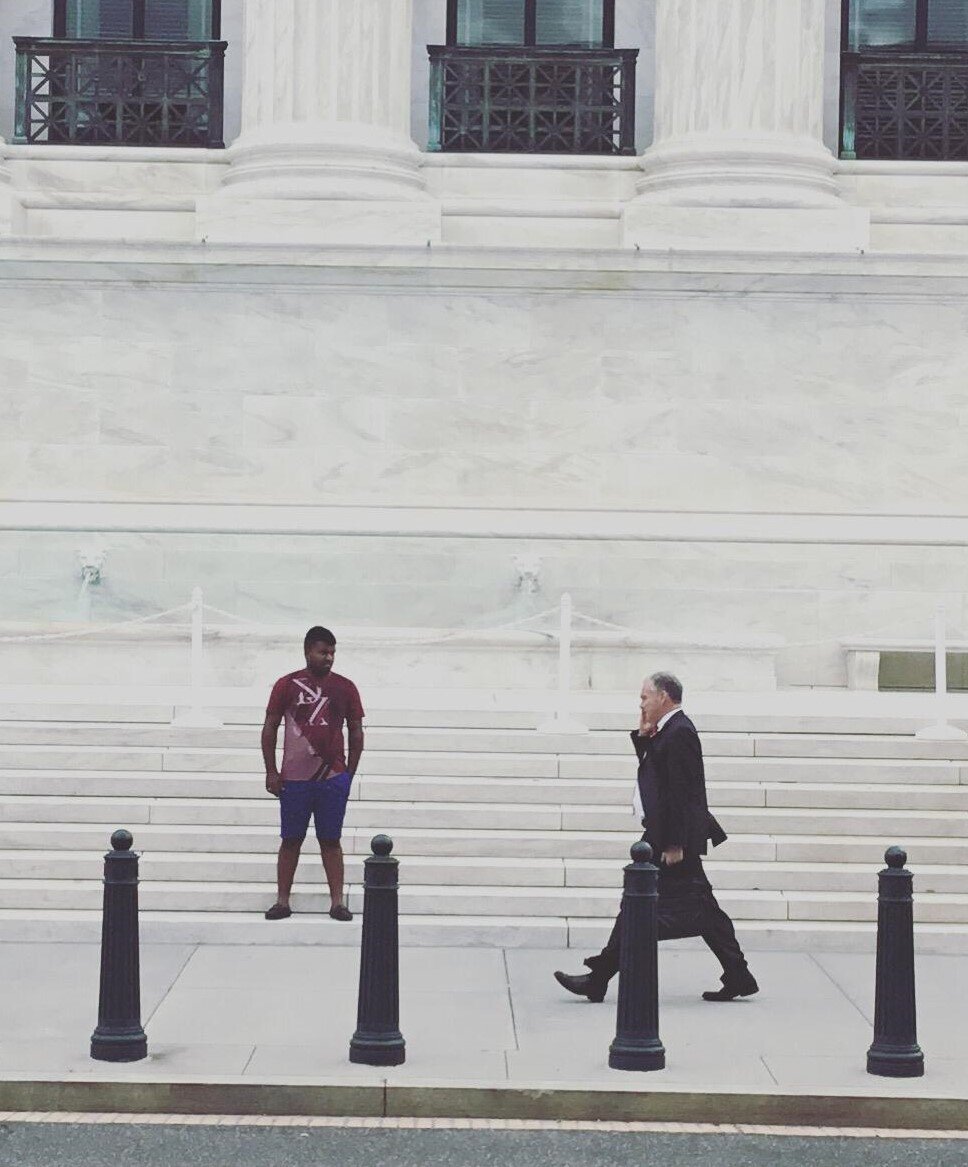
Anyways, I didn’t see any. But we did go visit the Washington Monument, the White House, the Bible Museum, and Capitol Hill. It was a great time. And something interesting happened around Capitol Hill. I was taking some pictures and all of a sudden I saw Hillary Clinton’s running mate, Tim Kaine, passing by. I thought, “That’s Tim Kaine!” He looked at me while talking on the phone and I said “Hi Senator.” He said “Hi” and kept walking. He was clearly busy. But I had followed the campaign very closely. I knew all the candidates. That moment was special because I had an encounter with American politics. And the best part of all is my friend got a photo of it on his iPhone.
After that we went back to the hotel and slept. The drive to DC from Columbus was seven hours and we were exhausted. We didn’t stop a single time on the drive over. My friend wanted to prove that we could make it there without stopping. I was surprised we only paid one toll on the way. Here in Colombia, you typically pay three or four tolls, maybe six or seven for a 7-hour trip. A sad thing happened on my trip the next day when we visited my friend’s alma mater, Georgetown University. My friend and a friend of his who traveled with us decided to work out at the university gym. But I didn’t have any gym clothes, and I don’t work out without gym clothes. Everybody was having fun and I was sitting there looking like an idiot. So make sure you bring gym clothes when you’re traveling with Americans.
What about your least favorite part?
Well, I don’t think of anything in terms of least favorite. Everything was a teaching moment. I didn’t like going to the gym when I was there, but I learned that it was important for my health. When I came back to Colombia, I found a gym similar to Planet Fitness, the gym we went to in the US. And because I wanted to preserve that feeling of being in America, I bought a membership.
We touched on this earlier, but how did your experience compare with your expectation?

I heard on the news that there was racism. And they were treating black people badly. And I don’t deny that there is some racism in the US. But I must say people there were very kind, very polite, very good people. It’s the opposite of what you see on the news. I hanged out with black people many times in the US. I saw black people being cordial with white people. I never knew how many black people there were in the US. One day my friend took us to a park to play basketball, and almost everybody there was black. I couldn’t understand a word they were saying. In Colombia, people used to make fun of me by calling me “black gringo.” To Colombians a gringo is someone with blonde hair, blue or green eyes, and white skin. I remember posting a video on Facebook of my friends in the US playing basketball. And I wrote down “for those who used to call me black gringo.” It was a kind of revenge. And so seeing all those black guys in the US was an amazing experience.
How did you find American English?
I had been watching a lot of American TV shows. Especially one called “The View” on ABC. On that show, there are African-Americans, white ladies, Italian Americans. It’s a good representation of how diverse America is. I also watched a lot of movies and the news in English, so I came prepared. My biggest issue was during the first few days. In Colombia I am maybe one out of 100 people who speaks English fluently. Hearing someone speak English here always catches me by surprise. And I focus on that individual. That’s one thing about the US—everybody was speaking at the same time. And sometimes in Arabic. It was frustrating trying to understand everything. I had to calm myself down and tell myself to just focus on one person. Quite frankly, I don’t know how they do it. It’s definitely a skill I have to develop.
It was also funny hearing little kids speak English. My friends’ cousins would sometimes argue with each other. I knew they were being mean because of their tone of voice, but I couldn’t understand what they were saying. I thought, “How do they do that? I want to learn.”
Biggest difference between the US and Colombia?

Economically speaking, there is a huge difference. The US is a superpower, Colombia is not. Their economy is better than ours. The infrastructure in the US is completely different and way more advanced. The food is totally different as well. It’s good food, but I would never trade my coconut rice for fried chicken and salad. And, as I mentioned, people playing sports. The most popular sport in the US is football, but you have a variety of sports–baseball, basketball, even a sport I had never heard of called squash. And people play them all. Here in Colombia we are more focused on one sport. There is some boxing, there is some baseball, but the most important is soccer. Everybody wants to be a famous soccer player. But I have to say that I love the energy of Colombia. And here we are very happy. I’m not saying they are not happy in America. But we have fun here in Colombia playing games like Dominos and UNO. In America, they have weird board games—complex games that involve strategy and trading. And people spend half of the game arguing about the rules. One thing I am very proud of is being Latino. I don’t like the language, but the energy is great.
Technology is another thing that makes a huge difference. Computers. Phones. When you go to the bank in the US, you don’t leave your car. Everything runs by technology, and it’s a really fast process. In Colombia, when you go to the bank, you spend almost the whole morning. I realized that technology makes peoples’ lives a lot easier. And then there’s security. I remember once when my friend arrived to his house, he parked and left the garage door open. And I said to him, “What are you doing?” He said it was safe and nothing was going to happen. I told him “You can’t do that in Colombia. If you leave the garage door open, you will find nothing inside when you get back.”
That would definitely depend where you live in the US. There are a lot of neighborhoods where the same can be said. . When you were in the US, did you make any social-cultural mistakes?
I remember on the first day I was in the US, I went to visit my friend’s uncle in his home. The neighbors were there in the living room, and I introduced myself to everyone. They asked me what I do for a living in Colombia. I said “I’m an English teacher.” And they said “How are your students?” I said, “I have some good students. But I have some really bad ones, and I want to kill all the bad ones.” That lady looked at me like “Who the hell is this guy?” I didn’t know it was a mistake at the time—I had gotten upset with some of my students the last semester before I left for the US. When we left that house, my friend said “You can’t talk like that in the US.” As we say in Colombia “metà las patas” (I screwed up).
So you stayed in Columbus, Ohio for a month and visited Washington, D.C. Have you had the opportunity to visit the US since then?
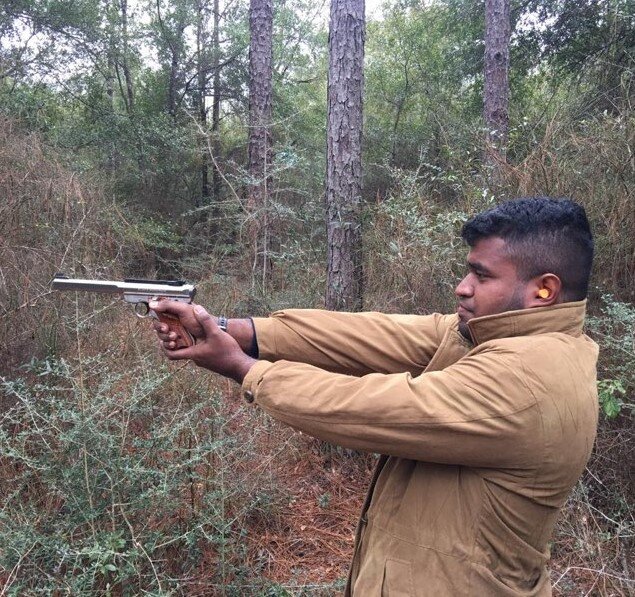
Yes, I went back in January of this year. It was a totally different experience. I visited Pensacola, Florida. After my first trip to America, I met another friend using the same language exchange application. He worked for the Air Force of the United States. And he happened to be the son of a pastor. He introduced me to his father and we became friends. He said, “When you come back to America, you have to come here and preach in my church.” I wanted to go back to the US during the winter. I planned to visit Columbus again so I could see snow because I had never seen snow before.
I did things on my trip to Florida that I had never done before. I went to a range and shot guns. I released a lot of tension that day. I was scared to try out the rifle, but next time I will do it for sure. The pastor wanted me to take bullets back home as a souvenir, but but I had to say no. I said, “If customs in Colombia finds out about it, they will think I’m a narcos.” I also drove a car for the first time and drank a vanilla cappuccino that was really delicious.
How were the meetings?

The meetings were fantastic. Being able to share the word of the Lord in the US. And being around so many wonderful people. I met a lady from Puerto Rico who knew I was Colombian. I was in the middle of my sermon and she was speaking Spanish. She said “Gloria a Dios, aleluya” in her best Spanish accent. Later we sat down and had a conversation in our native language. She said to me she was surprised by my English accent, that I could speak like a native. While we were there, I also got the opportunity to pray for someone in the hospital which was a powerful experience.
Any other memorable moments?
A similar thing happened on both of my trips to the US. Americans are really passionate about politics. I realized that the mention of President Trump’s name could be good or bad depending on the audience. If you mention his name, people might think you are against him. On the other hand, people might also think you support him. So you have to know how to talk about the president if you don’t want to offend anyone.
Did you get the chance to visit Columbus?
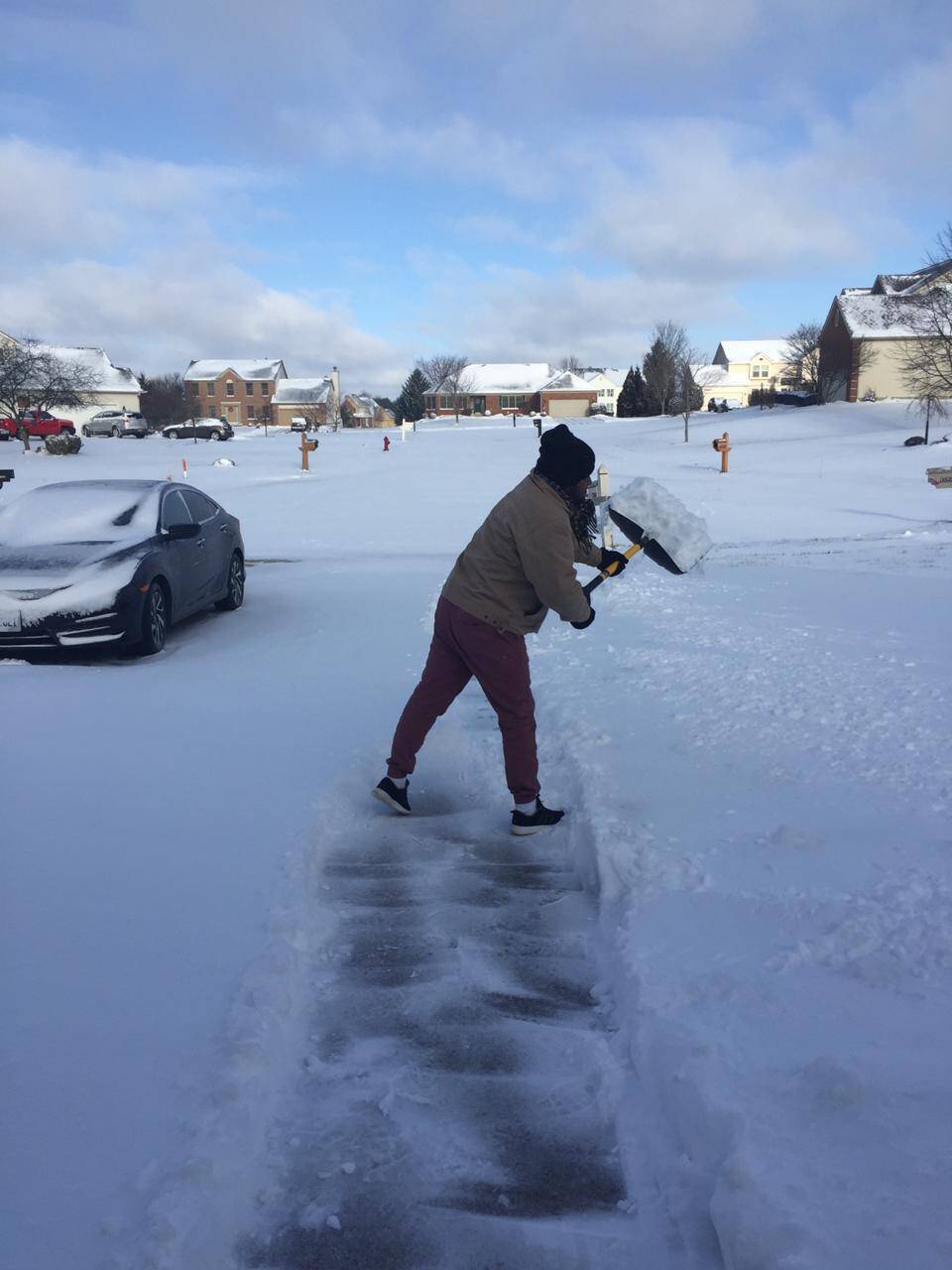
I sure did. And I prayed for it to snow. My friend told me if I was coming for only a few days I probably would’t see it. But it started snowing one or two weeks before I got there. And when I arrived there was a snow storm, so it was phenomenal.
Do you plan on going back to the US?
I actually plan on moving to the US next year. I know it will be a great experience. And hopefully I will find my wife.
So you plan on moving to the US and starting a family?
I don’t have a bad life in Colombia. But I want a new challenge, and that’s how I see moving to the US. It will require a lot of effort, a lot of money, but it’s a dream of mine. I want to begin a new chapter.
This is what you visualized?
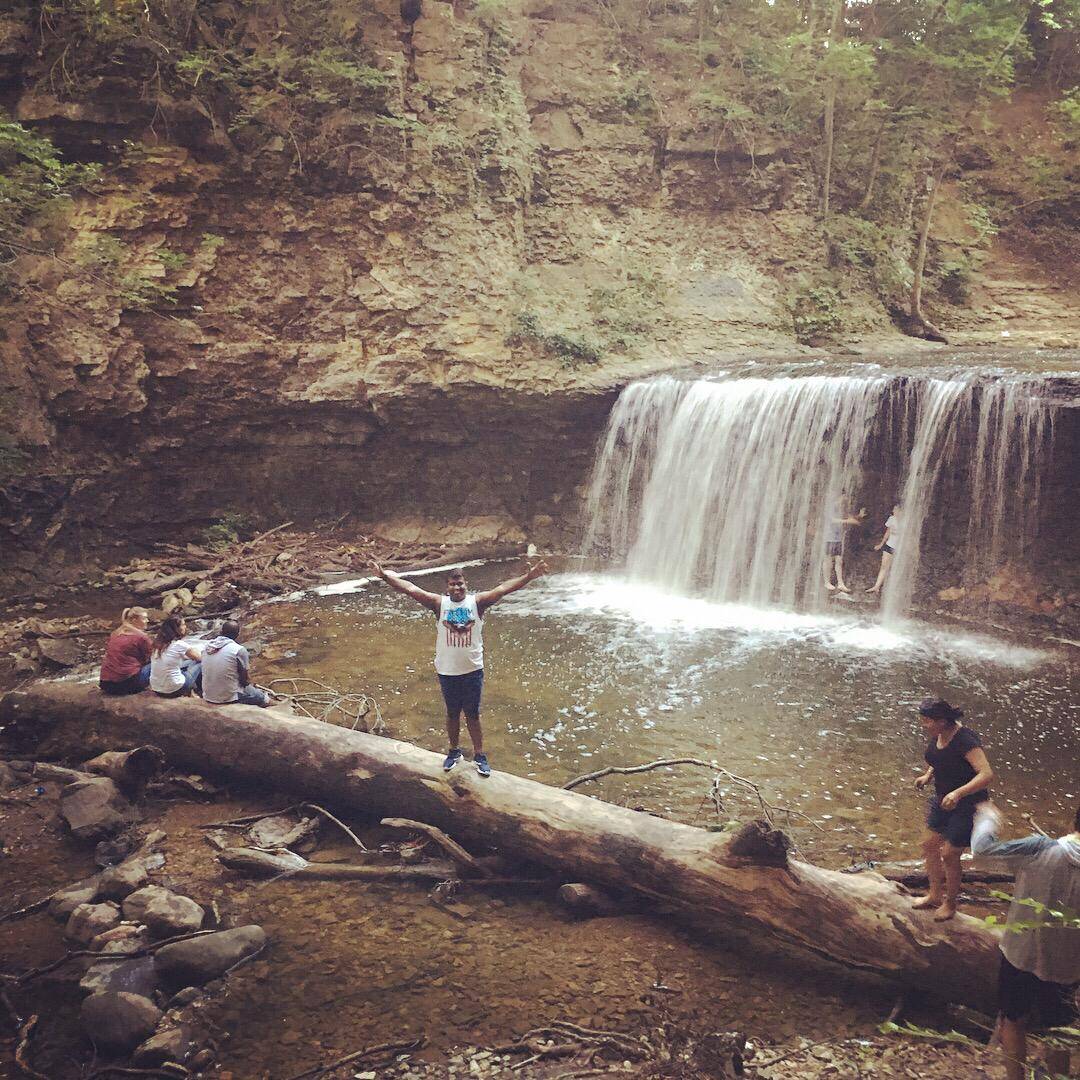
I will tell you straight up. When I am in the US, I feel like another person. My life in Colombia is from my house to the university and back. From my house to the gym and back. From my house to the church and back. But when I am in the US, I do things I have never done before. I go hiking. I go sledding. I shoot guns. I am a totally different person. And I like that version of myself.
What advice would you give to a foreigner visiting the US for the first time?
First and foremost, research the city you will be traveling to. The second thing may seem obvious, but know the language. If you don’t know the language, at least familiarize yourself with the basics. English proficiency is very important to having a good experience in the US. And be open to learning about the country. Don’t let preconceived ideas color your perception.
Lastly, be yourself. I am proud of my Colombian heritage. As I said before, I always tell people I have an American inside of me. But that American is Latino, too.

[…] month, I interviewed John David Contreras to get his perspective on the issue. Contreras has been featured elsewhere on this site elaborating on his colorful experiences in the United States. Contreras is a University Professor of English in his native Colombia and a Christian Pastor. He […]
[…] Pro Tips For Improving Your Accent In Any Foreign Language Featuring a University Professor; Life in the United States: Confessions of a Colombian Traveler; and A Spiritual Perspective: Fascinating Interview With A Christian Pastor. The following is an […]